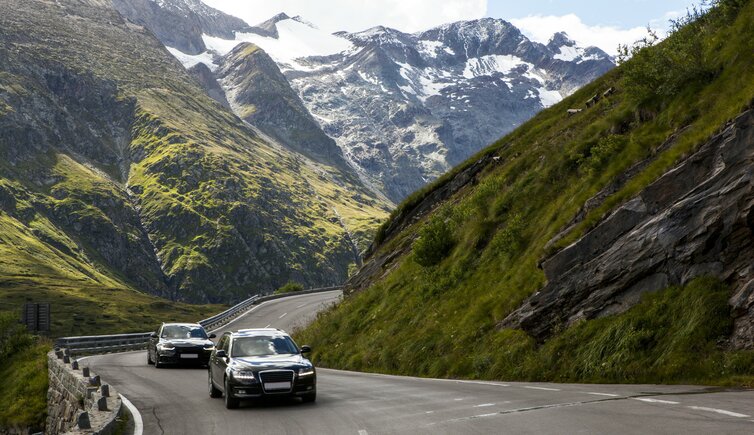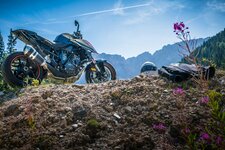This section provides important information for road users in North and East Tyrol, established in the Tyrolean Roads Act
The "Tiroler Strassengesetz" (Tyrolean Roads Act) refers to the law from November 16, 1988, regarding public roads and paths. You can find information about the most important ones - rescue lane, motorway permit sticker and winter equipment - in the homonymous articles.
-
Toll roads:
A number of roads in East and North Tyrol are subject to taxes, for example the panoramic road Kitzbüheler Horn and the Grossglockner high alpine road. -
Maximum speed (if not indicated differently):
The maximum speed for motorcycles and passenger cars (max. 3,500 kg) is limited to 50 kmph in town - 100 kmph out of town - 100 kmph on clearways - 130 kmph on motorways. The speed limit enforcements are constantly tightened. -
Driving under the influence of alcohol and drugs:
The drink-drive limit in Austria is 0.5 (0.1 for driving debutants, lorry and bus drivers). For drugs there is not yet a fixed limit value. A blood test gives proof of drugs. Who gets pulled over by the police with alcohol or drugs in the blood must reckon with stiff penalties - the spotchecks are constantly tightened. -
Phone calls when driving:
Making phone calls and reading/writing of text messages is not allowed. If you use a hands-free kit (if both hands are free) you can make phone calls. -
Light at daytime:
The obligation for cars to switch on the lights also at daytime has been abolished in January 2008, but it's still required at daytime in case of rain, snowfall and fog. Motorcycles, however, have to drive always with light at daytime. -
High visibility vest:
In Austria you have to wear high visibility vests, which have to be yellow, red or orange and conform to the Austrian norm ÖNORM EN 471. On highways the high visibility vest has to be worn when you position the breakdown triangle, on the motorway or other roads when the driver leaves the car. -
First-aid box and breakdown triangle:
Every vehicle has to equipped with a first-aid box and a breakdown triangle. -
Belts:
On all seats which are equipped with seat belts you have to fasten them. -
Child safety:
Children aged under 14 and a body size of less than 1.50 m have to be protected by an appropriate retaining device (ECE approved) on seats with seat belt. Only one child per seat is allowed (also in vans and minibuses). -
Safety distance:
The safety gap should be equal to the time you need to brake in order to avoid to drive into the car in front, which is usually one second. In case of higher speed, adverse road conditions or vehicles with trailers, the distance to the car in front should be much larger. An insufficient safety distance is dangerous and penally. -
So called "crawlers":
Driving extremely slowly without compelling reasons and thus obstructing or even endangering other road users is penally. -
Motorcyclists:
Helmets are required for motorcyclists. Moreover all rules regarding road safety also apply to bikes (safety gap etc.). Motorcycles have to drive always with light at daytime. From April 15 to October 31 - for the moment only in the districts of Reutte and Imst up to the German border - there is a driving ban on particularly loud motorcycles, i.e. all motorcycles with stationary noise (near field level) > 95 dB. A violation of the ban will be punished. -
Petrol:
There are four types of petrol characterised by different octane numbers: normal fuel (91 octane) - super petrol, super 95, euro super (95 octane) - super +, super 98 (98 octane) - premium petrol, super 100 (100 octane). Taking along fuel in spare canisters is allowed EU-wide, while it is limited to 10 litres in other countries. -
Vehicle documents:
Foreign travellers from the EU need the national driving licence and permission when entering Austria. Travellers from other countries need a German translation of the relevant documents or an inter-state driving licence. -
Entry documents:
For a stay of up to three months travellers from EU countries, Island, Liechtenstein, Norway, Great Britain and Switzerland need a passport without visa or a valid identity card. -
Entry with pets:
A Pet Pass with identification of the pets (by microchip or tattoo) as well as anti-rabies inoculation are required. Please note that if you come from a non EU country there are different regulations. For detailed information please contact the competent local authority.
For detailed information or for checking the up-to-date information, contact the Austrian automobile club by calling +43/512/3320-0 (ÖAMTC Tyrol).










